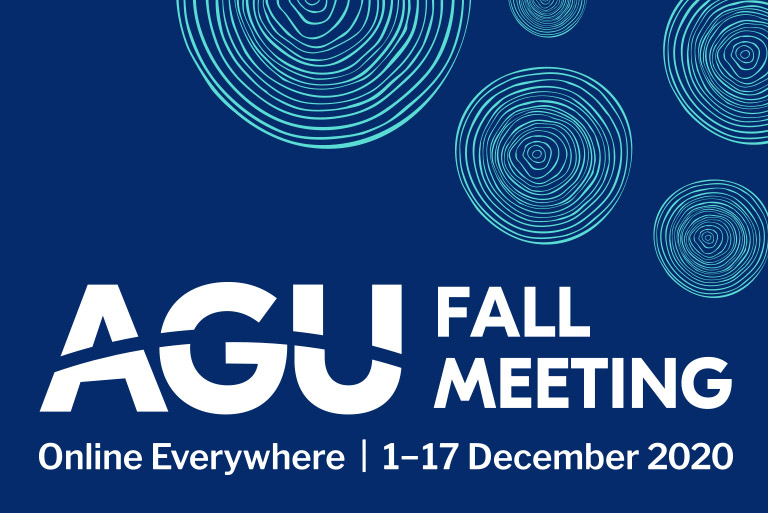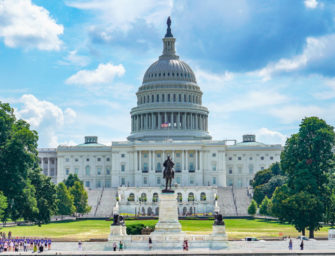#AGU20: Online Everywhere Experience
Fall Meeting is less than five months away. Our goal, with your input and counsel, is to co-create the most diverse, engaging and dynamic online experience to help advance your science and enhance your career. We’re focused on showcasing the Earth and space sciences and their growing connections and importance. As the meeting is online this year, we have the opportunity to engage an even broader range of scientists, including those who could not easily afford to travel and the public worldwide. What we develop this year will serve as a model for enriching and sharing content in future meetings when large gatherings are again allowed and will help minimize the carbon footprint of the meeting for the future.
This year’s theme, “Shaping the Future of Science,” was selected to reflect AGU’s new strategic plan and to look forward after AGU’s Centennial. It is even more timely with the change brought by the current global COVID pandemic. This theme evokes the opportunities, discoveries and solutions that will empower future generations and society, and calls on us to create the future of science as a whole, reflecting the growing importance and connections of Earth and space sciences with other disciplines for our shared future. Further information on the theme and resources are here.
Fall Meeting will be experienced in a completely different way. We are going to test a lot of new functions this year with the most popular offerings to become reoccurring features moving forward. We know and are pleased that together, we will be making the hybrid meeting for the future.
With science as its center, we are relying on several guiding principles to help us develop the online experience and programming at Fall Meeting.
- Personalization and quality of experience are core principles. These will be integrated through familiar sessions developed around electronic posters, eLightning presentations, oral discussions and an online exhibit hall. All sessions, and especially the poster sessions, will have the opportunity for scheduled and dynamically created impromptu panel discussions and informal chats. We will organize the schedule and daily schedules around themes and neighborhoods and have several exciting proposals for “meetings within a meeting” including a number of sessions featuring science related to COVID-19.
- As always, we are striving to make the meeting as diverse and inclusive. The Fall Meeting Program Committee will work with conveners to schedule sessions to optimize global participation. In addition, authors in oral sessions can leverage prerecorded talks, which allow captioning and on demand access, so that oral sessions can focus primarily on interactive discussions around the topic. All posters will use the ipostersessions.com platform, which allows for language translation and engagement and access across time zones, scheduled chats and short video presentations.
With a variety of ways to connect, you’ll never miss a session.
To minimize scheduling conflicts, we will be extending events around the meeting to the period from 1 to 17 December. While most of the scientific programming will remain from 7-11 December, some content will be presented leading up to this week, or after it.
With 1,000+ sessions, 100+ town halls hours, 20+ workshops, several “meetings within a meeting,” tools for self-organization and hours of networking and career development opportunities, the registration rates are <50% than when we were in-person. There are additional discounts for undergraduate student members, K-12 educators worldwide and attendees from low and lower-middle income countries. Plus, you don’t have to leave the comfort of your home or a nearby safe satellite gathering!
Not a member of AGU? We have cooperating society agreements in place with a number of organizations, including AAS, EGU, MSA, APHA, ESIP and ESA to submit abstracts at a member rate.
To protect privacy and provide for safety and security, everyone will be required to register to attend Fall Meeting and anonymous attendance will not be permitted or condoned. We are extending SafeAGU to the virtual environment.
As a reminder, abstracts are due 29 July by 11:59 p.m. ET. We’re pleased so many of you have already submitted!
If you register by 30 October, you will receive an early bird rate. As a reminder, accepted abstracts will be notified by 2 October.
Visit our registration page for additional details.
AGU will provide 100% refund of your registration as long as your request is received by 7 November 11:59 p.m. ET. via email: [email protected]
Any requests made after 8 November 12:00 am ET will be reviewed on a case-by-case basis.
| Registration type | Early bird rate (ends 30 October) | Regular rate (starts 31 October) |
|---|---|---|
| Member | ||
| Regular | $249 | $299 |
| Senior (65 & retired) | $100 | $125 |
| Student (Graduate level) | $100 | $125 |
| Student (Undergraduate level) | $0 | $0 |
| Non-member | ||
| Regular | $350 | $350 |
| Student (Graduate or undergraduate level) | $150 | $150 |
| Student (Undergraduate level) | $150 | $150 |
| Low income and lower-middle income country member/non-member | ||
| Regular | $0 | $0 |
| Student (Graduate or undergraduate level) | $0 | $0 |
| Other | ||
| K-12 teacher/informal educator* | $0 | $0 |
*Member-only




I have high school interns who had achieved remarkable scientific findings. Can they submit abstracts as first authors and present? What about their registration fee? Can they register under “K-12 educator” category? Thanks.
The Bright STaRS session (https://agu.confex.com/agu/fm20/prelim.cgi/Session/101307) is a dedicated session for middle and high school students wanting to submit their abstracts. We are encouraging all teachers and scientists working with students to contact the session convener and submit their abstract to this special session for our young scientists. You can learn more about Bright STaRS here: https://www.agu.org/Learn-and-Develop/Learn/Student-Competitions/Bright-Stars and contact Jennifer Saltzman [email protected] (the session convener).